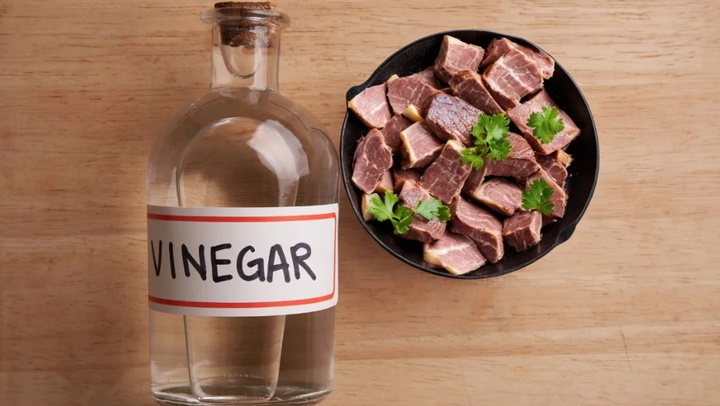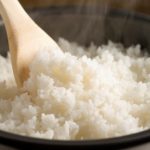Vinegar is a common ingredient found in most households. Besides using it for flavor enhancement, you can also use it for many other purposes. In particular, many people will be surprised to learn about the amazing benefits of pouring vinegar on meat or adding it to rice cookers and salad washes.
Amazing benefits of pouring vinegar on meat
When cooking meat, using vinegar provides the following benefits:
– Quick thawing of meat: Thawing meat naturally takes a long time, while rapid thawing methods are often not satisfactory or compromise the taste of the dish. Having a bottle of vinegar in your kitchen can come in handy for this problem.
After removing the meat from the freezer, simply pour vinegar directly onto the meat. The acids in vinegar lower the freezing point of water, allowing the meat to thaw faster. This method works for frozen pork, beef, and even chicken. Once the meat has softened, rinse it with clean water before cooking and seasoning to your liking.

Amazing benefits of pouring vinegar on meat: Quick thawing while preserving the taste. (Photo: Juliescafebakery)
– Odor elimination: Another amazing benefit of pouring vinegar on meat is that it helps to remove any unwanted odors after thawing, ensuring that the meat is tender and no longer has the unpleasant smell of frozen meat. You can use different types of vinegar made from fruits or white vinegar – they all have the same effect of making the meat tender and more delicious.
Similar to vinegar, you can also use high-acid fruit juices such as orange or lemon, or even tomato sauce to marinate the meat, enhancing its aroma, tenderness, and sweetness.
– Preserving meat freshness: Most types of meat have an alkaline pH, and if left in the environment for too long without cooking, they can become spoiled. Using vinegar is an effective way to preserve the freshness of meat and ensure the safety of everyone’s health.
Other uses of vinegar in the kitchen
In addition to using vinegar for thawing, odor elimination, and meat preservation, you can also use this versatile ingredient in the following ways:
Adding it to rice cookers
Soak the rice with clean water and add about 2-3ml of vinegar to the rice cooker, stir well, then cover and cook the rice as usual. The vinegar will make the rice grains softer, more fragrant, and easier to separate. This tip also helps prevent the rice from becoming sour or spoiled on hot days.
You can replace vinegar with lemon juice, which has the same effect.
Note: For every 1.5kg of rice, add 2ml of vinegar; adding too much vinegar will make the rice become sticky and sour.
Using it to wash vegetables
Typically, people wash vegetables with saltwater or baking soda. In addition to these two ingredients, you can also use vinegar that is readily available in your kitchen to clean fruits and vegetables.
The method is very simple, just dilute vinegar with water and soak the fruits and vegetables in this solution for about 10 minutes. The vinegar will help clean the fruits and vegetables better and keep them fresh and delicious.







































